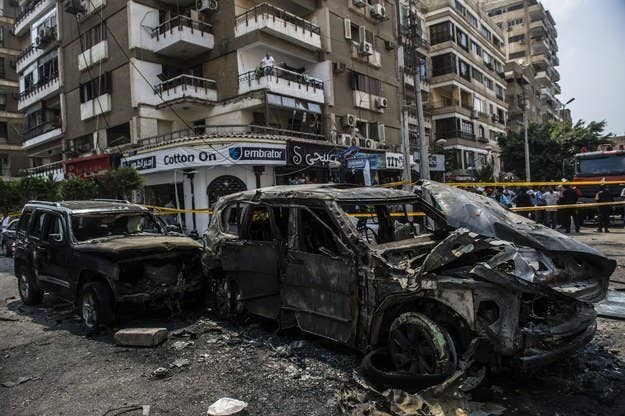
CAIRO — The assassination of Egypt's top prosecutor in Cairo on Monday marks a turning point in the clash between the country's government and its Islamist opposition — and another grim sign that the bloodshed will increasingly target the judicial system.
As Egyptian judges have handed out mass death sentences to members of the Muslim Brotherhood — including one to the country's former president, Mohamed Morsi — Islamists have made clear that they will seek violent retribution. Several Egyptian Islamists issued fatwas, granting approval to the killing of judges.
As BuzzFeed reported earlier in June, many judges recognized the threat, and some were even beginning to carry arms. But that was hardly enough to stop the attack that came on Monday — in which a car bomb ripped through the armed motorcade escorting the prosecutor, Hisham Barakat, through an upscale neighborhood in Cairo. Barakat later died of his wounds, marking the highest-profile assassination of a government figure in Egypt since the beginning of a violent insurgency that began in 2013 after the military overthrew Morsi, the country's first democratically elected president. The two-year anniversary of the street protests that sparked Morsi's ouster is on Tuesday.
The message the killing was meant to send to the government of President Abdel Fattah el-Sisi was clear: None of you are safely out of our reach.
The government, meanwhile, is sure to respond with violence of its own. It was quick to announce on Monday that the Muslim Brotherhood was to blame, though no group has claimed responsibility for the killing.
With the government likely to enact further crackdowns under the banner of its "war on terror" — and Islamists increasingly calling for vengeance — the cycle of bloodshed and crackdowns that has already gripped the country for the last two years promises only to roll on.
Monday's assassination may help the Sisi administration justify its increasing crackdowns on all opposition groups in Egypt, Islamist or not, and it may also help Islamists rally support on the ground, helping to unify cracks among their ranks, such as one brewing between the old guard and the youth.
But what will make matters worse is that both sides seem to take it personally, pushing the country down a road with no clear end but instability. Sisi considers Islamists his personal enemies, and an attack like this one that reached so deep into the state will likely rattle him hard. Islamists meanwhile blame Sisi for the deaths and incarcerations of friends and families — and they will continue to target those who they think enable Sisi to hurt them, prominent members of the judicial system foremost among them.

